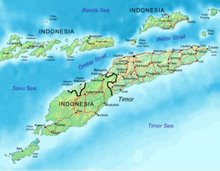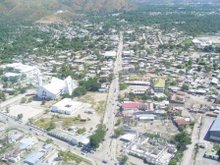
DILI (AFP) — A move to soften tough abortion laws in mainly Catholic East Timor is stirring opposition from the powerful Church.
Activists are backing a proposed law that would loosen the country's blanket ban and allow abortions for women whose lives are in danger.
But church leaders have refused to drop their objections that the bill, scheduled to be voted on by parliament next month, violates basic religious teachings.
"The church is opposing this because they always see abortion as a crime," said Filomena Barros dos Reis from the Alola Foundation women's rights group.
East Timor's current law, which was copied from Indonesia's criminal code during the country's 24-year occupation, bans abortion in all cases.
The new bill contains stiff jail terms of between two and eight years for abortionists and women who get abortions. It would also not allow abortions in the case of rape or incest.
But dos Reis said she has told church leaders that allowing abortions in the case of potentially fatal health complications would save lives.
"We still have a lot of pros and cons because the community of Timor-Leste, they still trust the church... so we are still discussing with the church," she said, using the country's official name.
Justice Minister Lucia Lobato told AFP last week that the proposed law would not significantly liberalise the government's strongly anti-abortion stance.
"The general principle is that abortion is a crime," she said.
"So a mother or a pregnant woman who gets an abortion, consciously or unconsciously, it's still a crime and it has to be processed legally so punishment can be made."
The one exception, she said, was if a doctor certified that the pregnancy was a threat to the mother's life.
This has proven too much for the Catholic Church.
"In principle, the church worldwide doesn't agree with abortion under any conditions because we have the technology to protect mothers, such as transplants," Pastor Martinho Gusmao, from the diocese in the city of Baucau, said in an interview last week.
Impoverished East Timor, which gained independence in 2002 after more than two decades of Indonesian occupation, has the world's highest fertility rate, with the average woman giving birth to eight children, says the United Nations.
Around 98 percent of the population is Catholic and most people remain unaware of birth control despite many church leaders throwing support behind programmes promoting contraception.
President Jose Ramos-Horta recently visited the Vatican and is reportedly eager to sign an agreement known as a "concordata" with the Holy See to formalise East Timor's status as a Catholic country.
The agreement reportedly would guarantee the church certain privileges in terms of its claims to land and property in East Timor, and would strengthen its influence on issues such as abortion.
Activists are backing a proposed law that would loosen the country's blanket ban and allow abortions for women whose lives are in danger.
But church leaders have refused to drop their objections that the bill, scheduled to be voted on by parliament next month, violates basic religious teachings.
"The church is opposing this because they always see abortion as a crime," said Filomena Barros dos Reis from the Alola Foundation women's rights group.
East Timor's current law, which was copied from Indonesia's criminal code during the country's 24-year occupation, bans abortion in all cases.
The new bill contains stiff jail terms of between two and eight years for abortionists and women who get abortions. It would also not allow abortions in the case of rape or incest.
But dos Reis said she has told church leaders that allowing abortions in the case of potentially fatal health complications would save lives.
"We still have a lot of pros and cons because the community of Timor-Leste, they still trust the church... so we are still discussing with the church," she said, using the country's official name.
Justice Minister Lucia Lobato told AFP last week that the proposed law would not significantly liberalise the government's strongly anti-abortion stance.
"The general principle is that abortion is a crime," she said.
"So a mother or a pregnant woman who gets an abortion, consciously or unconsciously, it's still a crime and it has to be processed legally so punishment can be made."
The one exception, she said, was if a doctor certified that the pregnancy was a threat to the mother's life.
This has proven too much for the Catholic Church.
"In principle, the church worldwide doesn't agree with abortion under any conditions because we have the technology to protect mothers, such as transplants," Pastor Martinho Gusmao, from the diocese in the city of Baucau, said in an interview last week.
Impoverished East Timor, which gained independence in 2002 after more than two decades of Indonesian occupation, has the world's highest fertility rate, with the average woman giving birth to eight children, says the United Nations.
Around 98 percent of the population is Catholic and most people remain unaware of birth control despite many church leaders throwing support behind programmes promoting contraception.
President Jose Ramos-Horta recently visited the Vatican and is reportedly eager to sign an agreement known as a "concordata" with the Holy See to formalise East Timor's status as a Catholic country.
The agreement reportedly would guarantee the church certain privileges in terms of its claims to land and property in East Timor, and would strengthen its influence on issues such as abortion.







1 comentário:
hht
Enviar um comentário